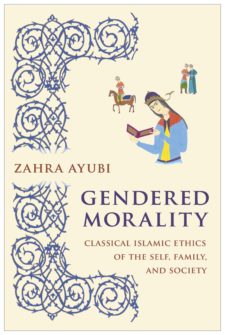 Zahra Ayubi’s Gendered Morality: Classical Islamic Ethics of the Self, Family, and Society reads three important Persian texts in the Islamic ethical tradition—Abu Hamid Muhammad al-Ghazali’s Kimiya-i Sa‘adat (Alchemy of Happiness), Nasir-ad Din Tusi’s Akhlaq-i Nasiri (Nasirean Ethics), and Jalal al-Din Davani’s Lawami‘ al-Ishraq fi Makarim al-Akhlaq (Lusters of Illumination on the Noble Ethics), also known as Akhlaq-i Jalali (Jalalean Ethics)—with an eye towards the “gender constructions and dynamics” that shape these authors’ claims about what it means to lead an ethical life (13). What she finds is that there is a tension present in all three of these works, between a hierarchical vision of the world—one which treats women and nonelite men as means, rather than ends, for the achievement of the good life of elite men—and a universal account of the nafs (soul), which treats all physical matter and beings as having equal value as God’s creations. She shows that this tension has, unfortunately, too often been glossed over by scholars, leaving the “philosophical underpinnings” of patriarchy in the tradition unaddressed (5). Through an immanent critique of the classical texts, she shows the limitations of approaches that seek to rescue akhlaq writings—or works concerning ethics—from their patriarchal assumptions, and demonstrates what is required for the creation of a feminist Islamic ethics out of an engagement with them.
Zahra Ayubi’s Gendered Morality: Classical Islamic Ethics of the Self, Family, and Society reads three important Persian texts in the Islamic ethical tradition—Abu Hamid Muhammad al-Ghazali’s Kimiya-i Sa‘adat (Alchemy of Happiness), Nasir-ad Din Tusi’s Akhlaq-i Nasiri (Nasirean Ethics), and Jalal al-Din Davani’s Lawami‘ al-Ishraq fi Makarim al-Akhlaq (Lusters of Illumination on the Noble Ethics), also known as Akhlaq-i Jalali (Jalalean Ethics)—with an eye towards the “gender constructions and dynamics” that shape these authors’ claims about what it means to lead an ethical life (13). What she finds is that there is a tension present in all three of these works, between a hierarchical vision of the world—one which treats women and nonelite men as means, rather than ends, for the achievement of the good life of elite men—and a universal account of the nafs (soul), which treats all physical matter and beings as having equal value as God’s creations. She shows that this tension has, unfortunately, too often been glossed over by scholars, leaving the “philosophical underpinnings” of patriarchy in the tradition unaddressed (5). Through an immanent critique of the classical texts, she shows the limitations of approaches that seek to rescue akhlaq writings—or works concerning ethics—from their patriarchal assumptions, and demonstrates what is required for the creation of a feminist Islamic ethics out of an engagement with them.
Ayubi’s book is an example of rich feminist-critical and philosophical ethics. It attends to the social contexts in which these thinkers write, but also seeks to move beyond those contexts in order to show, more broadly, how the shared assumptions of these authors have shaped Islamic ethics. Ayubi begins by unpacking the broad epistemological assumptions that characterize these works and their reception within the tradition before turning her focus to the themes of metaphysics, marriage, the domestic sphere, and homosocial masculinity and social life. Each chapter of the book weaves together the works of the three philosophers and theologians under one of these common themes. The book ends with some reflections on what a feminist philosophy of Islam might look like. She suggests that because the discriminatory nature of akhlaq literature was founded on inegalitarian metaphysics, any overcoming of such discrimination will require the construction of an egalitarian metaphysics (267), one that is attentive to the need for intersectional analysis, and does not succumb to the illusion that the patriarchal assumptions that have shaped akhlaq literature can simply be ignored.
In response to Ayubi’s book, the essays in this symposium read Ayubi with attention to the interventions she makes into Islamic ethics and beyond. Kecia Ali reflects on the approach Ayubi takes to reading the texts, comparing Ayubi’s approach to these ethical treatises with the interpretation some people make of the US Constitution. Such an approach seeks to recover from a text like the Constitution or an influential ethical treatise a universal ideal of equality that has nonetheless not yet been realized. On Ali’s reading, Ayubi successfully demonstrates the possibility of building from the akhlaq texts an egalitarian ethics. Kathryn Kueny reflects on whether that hope—to recover an egalitarian ethical impulse from an inegalitarian metaphysical system—is one that is actually realizable, and suggests looking to sources outside the akhlaq canon might prove more valuable. Saadia Yacoob compares Ayubi’s account of ethical refinement to her own work on Islamic law, and wonders if the interdependence of family members upon one another that Ayubi describes in her account of the domestic sphere could be reconfigured toward more egalitarian ends. Robert Tappan moves in a slightly different direction, discussing how Ayubi’s work might be expanded into the realm of animal ethics, so as to help us imagine a world beyond speciesism. Finally, Travis Zadeh reflects on how the thinkers whom Ayubi analyzes, along with others, adhered to a politics of perfection, much to the detriment of anyone who was not an elite male. Ayubi’s work, he contends, points us to the need for a politics of imperfection. In her response, Ayubi addresses the aforementioned essays by expanding upon the argument made in the conclusion of the book.
In thinking through how the politics of perfection laid the groundwork for the patriarchal element in some forms of Islamic ethics, Ayubi calls attention to the dynamic relationship between past and present in ethical and philosophical discourse. Because Contending Modernities is focused on how religious and secular forces interact in the modern world, it is pleased to host this symposium which thinks through what it means to imagine anew the possibilities and limits of canonical texts in the tradition of Islamic ethics.

